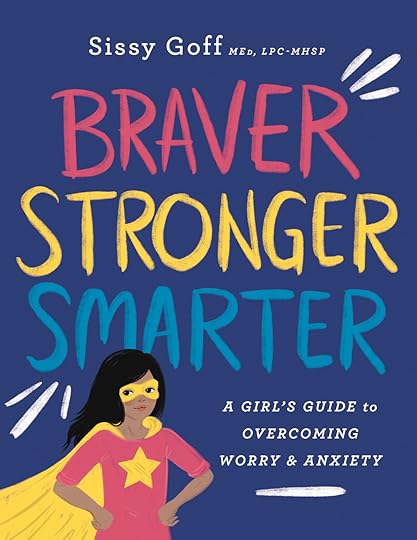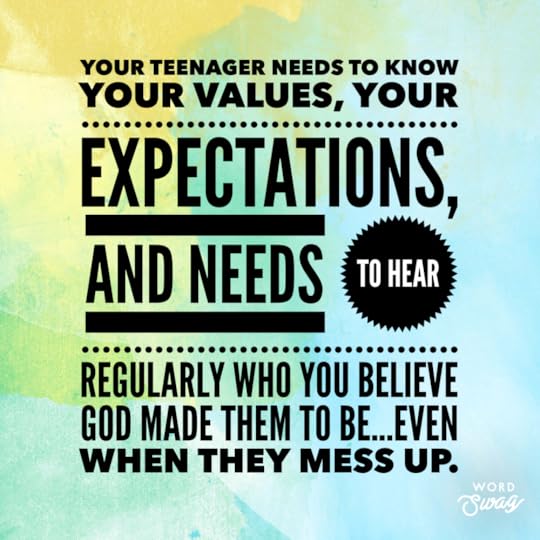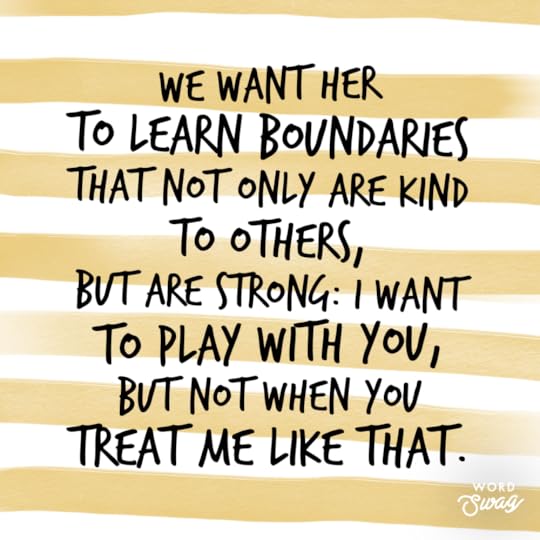Sissy Goff's Blog, page 2
May 16, 2019
Talking with Teenagers: Sports

I recently saw a movie called “The Miracle Season.” If you haven’t seen it yet, I’d highly recommend watching it with the teenagers in your life. It can create some great conversation around not only the plot, but many of the conversations and lines contained therein. In fact, many sports movies can. They tug at our heart strings from an underdog kind of place, but also from a place of remembering the messages we heard…or the emotions we felt when we were on the fields and courts of our own childhoods.
What do you remember? How did you feel when you scored the winning soccer goal? What about when you missed the what-would-have-been-winning field goal? What kinds of memories do you have when you think back to PE class? Were you picked for teams first? Or last? Something about the experience of sports touches on our confidence…and our shame in ways that not many other things can. In fact, right now it is doing the very same thing for the teenager in your life.
“Man up!” is one of the most common phrases boys hear in their athletic lives. A girls’ version of that statement might be “Toughen up!” And, for the girls who don’t, or can’t seem to make themselves, sports often falls by the wayside in their growing up years. In its place, develops an insecurity around the more sports-oriented areas of life. Think back on your child’s athletic life thus far. How do you think he feels? What do you think she remembers the most? Teenagers are in the most insecure phase of life any of us go through—even if they’re not acting like it. In fact, boys often get bigger in the face of their insecurity. Regardless of their bravado or the lack thereof, we want to be moving toward them with empathy and compassion. It always helps to put ourselves in their shoes…to not only remember what it felt like for us to be their age, but to imagine what they might be feeling right now. It also helps to dispel some of that perpetual teenage mantra of “No one understands me!”.
So, spend a few minutes thinking back…about your life and theirs. And then, in that back door way we talk about every month, start a conversation. In other words, stay up a little later and talk to them at bedtime, or on a walk, or in some other window of time that feels a little more relational and a little less intense. Talk about their feelings around sports. It might even help to wander into a conversation after watching a movie together, or mentioning that you read an article, or something that makes the conversation feel a little more casual. A few conversation starters might include:
Tell me what PE was like for you when you were little?
What kinds of things do you remember hearing from your PE teacher? What about from coaches when you were younger?
Did you feel pressure to be a certain kind of way? To perform a certain kind of way?
Do I ever make you feel pressure?
When do you feel the most confident? When do you feel the least? When was it fun for you? Does it ever bring you joy?
When do you feel the most like you?
You can even share some of your own stories about athletics growing up…especially if they’re ones that include foibles or failures. Again, even if they don’t act like it at the time, they’re highly aware of their own struggles. And so your admission of yours helps them feel more accepted in the midst of theirs. It also continues to strengthen the connection between the two of you, which is still foundational for your son or daughter—even in their teenage years.
-originally published in Parenting Teens magazine
April 30, 2019
They. Are. Here. Pre-Order Sissy's New Books
We are so excited to announce the pre-order of Sissy’s new books. We have been so excited to share the covers for the new books with you and start the official countdown to September 3rd!!! Head on over to the Amazon to pre-order now! And stay tuned for more information on how you can be a part of the launch team!

Raising Worry-Free Girls
“If you have a daughter, it would be surprising if she doesn't struggle with anxiety and worry--either in short episodes or for longer periods. For a variety of reasons, childhood anxiety rates are soaring, especially among girls. Today's parents need to know what contributes to anxiety and worry and how they can empower their daughters to overcome troubling emotions.
In this immensely practical book, veteran counselor Sissy Goff shares how you can instill bravery and strength in your daughter. Addressing common age-specific issues, Goff gives you the tools to help you and your child understand why her brain is often working against her when she starts to worry, and what she can do to fight back. With your help, she will find the anchoring truth of God's strong, safe love for her and the confidence she needs to thrive.” You can pre-order it here!
Braver, Stronger, Smarter: A Girl's Guide to Overcoming Worry and Anxiety

“As a parent, you can use certain strategies to help your elementary-aged daughter when she struggles with worry and anxiety. But it is also important that she learn how to work through her emotions on her own.
This illustrated guide--created for girls ages 6 to 11, the stage when anxiety issues often surface--will help your daughter see how brave, strong, and smart God made her. Through easy-to-read stories and writing and drawing prompts, she will learn practical ways to fight back when worries come up. She will feel empowered, knowing she is deeply loved by a God who is bigger than her fears. This level of trust is the spiritual antidote to anxiety and the path to feeling capable and confident in any situation.” You can pre-order it here.
April 16, 2019
Technology Tuesday: Raising Boys and Girls Podcast

ANNOUNCING SEASON 2 OF OUR PODCAST ON MONDAY, APRIL 22ND! Check back on our site or wherever you download podcasts to get our latest season of what used to be called Are My Kids on Track but is now Raising Boys and Girls. You can also head over to our website for downloadable discussion questions and a discussion guide.
One of our very favorite things in the past year is being out on the road at your churches and schools and hearing that you’ve downloaded the Are My Kids on Track podcast…and that you’re being able to use ideas like the Space or the Yellow Light list in your home and with your kiddos. So, we wanted you to have more! Season One, hosted by podcast host extraordinaire Sarah Bragg, is based on the Are My Kids on Track book, where we take the 12 emotional, social, and spiritual milestones we believe every child needs to reach and is reaching to a lesser degree than ever before.
In Season Two, we dig a little deeper into the whole Raising Boys and Girls content, based off of Wild Things and Raising Girls. In it, we discuss the Ages and Stages of boys and girls—who they are and what they need from the grown-ups who love them at every stage.
Our hope is that these podcasts will create both conversation and community—two things we’re all about at Raising Boys and Girls. Download and listen to them with your spouse, a group of friends, or even to dig a little deeper into who you want to be as a parent. Both seasons have free Discussion Questions below that you can use with your people, either in pairs or in a small group.
We also have put together an added bonus for Season Two! We’ve got a Discussion Guide for every stage! The first section is a free sample on you as a parent. And then there are five more that you can download here. In each, we’ve got a summary, more discussion questions, a Try in Out section for boys and girls with practical ideas you can implement at home, 6 devotionals to mirror that particular stage AND movies and books we would recommend to watch and read with your kids.
Happy listening, and reading, and, more than anything else, happy connecting…with your spouse, with your friends, but mostly with the kids God has purposefully chosen for you.
April 11, 2019
Talking with Teenagers: Substance Abuse

Just heard for the I’m not sure how many’th time in my 25 years counseling kids, “I don’t know why my parents got mad at me. It wasn’t my weed.” You can substitute alcohol, or Juuls, or any other substance that’s trending these days. And, honestly, in all of those years, that statement has almost never been true. If you find a substance in your child’s room, or in their car, chances are it really is theirs. Or, at least 99% of the time it belongs to your child, not the friend they’re trying to “keep out of trouble.” They are not keeping it for someone else and wouldn’t risk getting in trouble themselves, no matter how “good of a friend they are”, or how “worried they are about them,” or even “how awful their parents are.” (Can you tell I’ve heard LOTS of the excuses over the years?) So, what do you do? This monthly article is meant to spark conversation, to create meaningful dialog with the kids you love. But, how do you have meaningful dialog when they’re making destructive choices…or is there even a chance that they might?
It is tough. And, it’s tough in general to parent in light of all that the kids we love are being exposed to on a daily basis. But, conversation continues to be profoundly important. Before they even get to the age where kids are experimenting with substance use, you want to start the conversations.
Tell me what you know about being a teenager? What is there to look forward to? What do you think’s tough about it? What do you want to be like when you’re a teenager? Have you heard of peer pressure? What do you think that means? And then, based on what they know, fill in the gaps. But, be mindful of lecturing. Lectures really don’t help. Talk with them. Help them understand how hard it really can be to make good choices, but how proud you will be of them when—not if—they do.
As they get older, continue the conversation. But, beforehand, make sure that you know you’re there to listen and not to judge. (And not to panic is important, too.) What’s the culture like in your school these days? Are you hearing much about alcohol or drugs? Are kids vaping? Why do you feel like it’s happening? What do you think would help? How can I support you? And talk with them gently about your expectations and hopes for them.
If, at some point, your child does experiment with substances of any kind, first, they need consequences. It’s always helpful to know your child’s currency…a car, friends, technology, whatever you think will have the most impact. Consequences that are shorter-term and intense are most helpful. If they’re grounded for 6 months, teenagers live so much in the present, that they can’t remember why they were grounded in the first place by the time the grounding is over. And then, talk with them. They need to hear truth from you, but they also need to talk with you. What was going on? What do you think got you to this place (a more helpful and non-threatening way to ask “why”)? What was it like for you? What do you want to do differently next time? How can I help?
Your teenager needs to know your values, your expectations, and needs to hear regularly who you believe God made them to be…even when they mess up. And, they also need to learn to connect the dots on their own. Conversations help…and your belief in who they are and who they can be does, too.
April 2, 2019
Technology Tuesday: Attractiveness Apps

“It’s this app that basically tells you how pretty you are.” Ugh. Here we go again. The Technology Monster is rearing its ugly, critical head. Several of the high school girls in my group recently started talking about an app that rates their attractiveness. They’re honestly all over app stores. They’re called everything from Beauty Score to Ugly Meter, and, of course, they’ve caught on with adolescent girls. They basically use an algorithm that bases on attractiveness on a mathematical equation called the “golden ratio” that defines perfect proportions. It scans a user’s face or photo, and then rates that person based on the proportion and placement of their features. It’s not real beauty. But, what authority do the children and teenagers we love typically trust? Google. The internet. Whatever their favorite app is at the time. And these children and teenagers are just forming their identities and their confidence. Beauty is NOT in the eye of an app. Beauty is not about symmetry or proportion. Beauty is about the heart…and strength and compassion and empathy and hopefulness. So many things that she can’t find in an app. And so many things that she needs you to remind her of. Choose three things about the girls in your life today that are beautiful. You can remind her of how she looks, but go much deeper, too, to who she is. That’s the kind of beauty that is lasting and can never be touched by technology.
March 19, 2019
Technology Tuesday: Headspace

A big part of the work we do at Daystar is coaching kids on how to calm their brains and bodies. If a child is struggling with anxiety or anger, ADHD or depression, social struggles or strong emotions, learning to regulate is a foundational skill. We teach kids how to get from their “Dinosaur Brain” back to their thinking brain - the part of the brain that allows us all to manage emotions and think rationally.
Learning this allows kids to navigate test anxiety, homework hurdles, sibling rivalry, friendship struggles, game day jitters, and all the other moments of life when we feel strong emotions and need to make thoughtful decisions.
Headspace is an app for kids, adolescents and adults that teaches meditation in short, easy, straight-forward ways. The app includes reminders, rewards, sleep support and ways to connect with friends for motivation. It’s compatible with the Apple Health app and Apple Watch.
We’ve encouraged parents to test-drive the free trial with kids as a way of learning the practices together, and reminding kids this is a valuable skills set for kids and grown ups alike.
March 14, 2019
Talking with Teenagers: Big Decisions & Big Questions

As I’m writing this, I’ve talked to multiple kids in the last few weeks who have had to make one of the biggest decisions of their lives: where they’ll go to college. But, ultimately, there are big decisions for the adolescents we love to make often. Will she take AP or regular classes? Will he apply for Governor’s School? What clubs will she join? Which friends will he choose? And then, of course, there are the big decisions we hope that will involve a lot of “No’s” to the culture around them, and a lot of “Yes’s” to God.
How can we help? The first thing, maybe the most important thing to remember is that you are preparing them to launch. And our help in these years is doing just that: preparing. It’s not choosing for them. It’s teaching them to choose. CS Lewis said, “The proper aim of giving is to put the recipient in a state where he no longer needs our gift.” The same holds true for parenting. How can you set them up to make decisions with thoughtfulness, with responsibility, with heart, and with the discernment that can only be found through Christ?
Have them practice now.
In my counseling practice, my two favorite words with parents of teenagers are “questions” and “empathy.” I’ve said them before in this column…maybe, actually, every month. But, I can’t say them enough. Questions and empathy. We want them to learn to make good decisions in the big things, and so we’ve got to give them practice making decisions in the little and big things along the way.
“That sounds like a tough situation. What do you think would help?”
“I can’t tell you’re really struggling. What do you think is the best thing to do?”
“That’s hard. I’m so proud of you for wrestling through it. What do you think God would want you to do in this situation?”
“I’m so sorry you’re hurting. You’re making great decisions. I know you can get through this. I’m here, if you need me. What do you want to do?”
The questions communicate our belief in them. Even when your teenager hasn’t been making such great decisions, ask anyway. Give them a chance to connect the dots. Your connected dots don’t hold in college.
If it feels like they’re not hearing your voice, (which many teenagers don’t—it’s normal), pull in other trusted adults. Call their youth director or small group leader and ask them to initiate some time with your child. Help them find other voices that they and you trust for wise counsel.
We also recommend giving choices, if they’re in their younger teen years. “Every teenager in our house chooses one club at school. You get to pick.” Or, if they’re older and bucking being a part of youth group or a Christian activity, “As long as you live in our house, you’ll go to one Christian activity a week. You get to pick what that is.”
Teenagers want to know that you trust them. Part of how we communicate that trust is giving them the power to make choices…with bigger stakes as they get older and prove themselves responsible. And, in the meantime, and even the aftertime, ask questions. They need to stand on their own feet to make the transition to adulthood. And sometimes, that means getting our feet, and lectures, out of the way. They can do it. You and they need to believe that they can.
-originally published in Parenting Teens magazine
March 5, 2019
Technology Tuesday: D6 Podcasts - Is My Son or Daughter on Track?

David and Sissy had the privilege of being guests on the D6 podcast. They each share from their book “Are My Kids on Track” about the different milestones that boys and girls should be meeting - social, emotional, and spiritual.
Check out David’s episode here.
Check out Sissy’s episode here.
February 28, 2019
How do I Help My Daughter/Son Develop Healthy Friendships?
Just like girls develop physically and mentally, they also develop socially. (Boys do, too although their social development looks a little different…) than girls. We’ll let David tackle that one!)

As they develop, I believe there are a few important truths to instill in them across the ages. But, keep in mind, it is normal for their focus to shift from you…to having a best friend…to having a “group” to find a sense of belonging. And, then, yes, the focus will likely shift to the opposite sex—but that is WAY down the road, so we sure don’t want to borrow trouble for now!
For now, she’s starting the progression of developing friendships with other girls. In doing so, we want her to learn a few important truths to undergird her relationships. One is that there are ALWAYS two sides of the street. She will come home from school having hard her feelings hurt by some friend or even teacher countless times over her school-age years. You want to start by listening. She longs to feel heard and understood. It can even help to reflect her feelings back with empathy. “That sounds really hard.” “Yes, it makes so much sense that would make you sad” kinds of comments.
Second, ask her questions. What does she want to do about it. What does she think would help the situation. Every time we ask kids questions, we not only prompt their problem-solving skills, but we also remind them that we believe in their problem-solving capabilities. It reinforces in them that we believe in them—both who they are now and who they’re becoming.
Finally, help her learn boundaries. Every time I speak at a parenting seminar about girls, I talk about the combination of strength and kindness. We want her to learn boundaries that not only are kind to others, but are strong. “I want to play with you, but not when you treat me like that.”
I may be going out on a limb, but I have a hunch, that all of us women who are reading (or writing) this article, would have significantly healthier relationships had we learned these important truths at eight or eighteen—rather than in our adulthood.
How can I coach my son in friendships?
Generally speaking, navigating the maze of friendships isn’t as hurdled or complicated for boys as girls. Unfortunately, boys don’t know how to be as supportive in their friendships as girls. The bottom line - both genders can learn something from the other.
Boys tend to have an ability to forgive and move on. They don’t linger and harbor resentment. They can be angry with a friend in the morning, and happy to hang out by afternoon. It’s a gift, and we want to support and call out this strength.
In terms of challenge, boys (and males of all ages) are highly competitive creatures. Unless we’re aware, competition can become a relational strategy. As valuable a context as sports are, it can’t be the only context. Otherwise, he can get stuck in a pattern of being only against and not for someone. Similarly, competitive talk can become a pattern within conversation. Every time a friend names a success, a boy’s instinct becomes “one upping.” Role-play is a useful, experiential tool to help boys practice being supportive and loyal.
Boys also need coaching in how to go deeper. Males have a tendency to stay on the surface in relationships, whereas females go deeper. Boys benefit from practicing one or two questions that allow them to swim below the surface. This training prepares boys to be adult males who know how to share life honestly with a few close friends.
This article was originally published in Parent Life magazine.
February 19, 2019
Technology Tuesday: Whole Motherhood Podcast - How to Talk to Your Kids about Sex

We so loved meeting Amanda and Hillary and were honored to be asked to be a part of their Whole Motherhood podcast on how to talk to your kids about sex. Check it out wherever you listen to your favorite podcasts!



